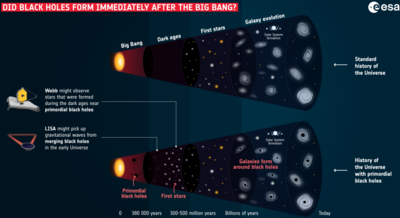Primordial black hole
In cosmology, primordial black holes (PBHs) are black holes that we think might exist in the Universe today. These black holes might have been created just after the Big Bang.

Immediately after the Big Bang, when the Universe was still getting bigger, the universe was an extreme place full of subatomic particles and lots of energy. Inside this extreme place, there were places where matter was very denser than the matter around it. In these places, gravity caused these places to collapse. This gravitational collapse would have created primordial black holes. These black holes are not created when very massive stars die like with stellar black holes but we're created in the early universe.
The idea of primordial black holes was first introduced by Yakov Borisovich Zel'dovich and Igor Dmitriyevich Novikov in 1966. But, it was the Stephen Hawking who studied these interesting objects even more in 1971.[1] Whether or not primordial black holes are real is still being talked about by scientists.
In September 2022, researchers gave an idea that primordial black holes might be the reason for the very massive early galaxies found by the James Webb Space Telescope (JWST). Another interesting idea is that primordial black holes could be dark matter though we don't know if this is true.
References
change- ↑ Hawking, S. (1971-04-01). "Gravitationally Collapsed Objects of Very Low Mass". Monthly Notices of the Royal Astronomical Society. 152 (1): 75–78. doi:10.1093/mnras/152.1.75. ISSN 0035-8711.
{{cite journal}}: CS1 maint: unflagged free DOI (link)